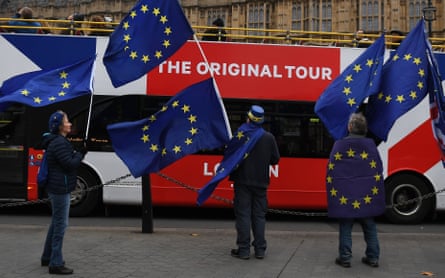Barely had the results of the EU referendum sunk in when a doctored photo of the famous banner that hangs from Madrid’s Cibeles palace began doing the rounds on social media. The “refugees welcome” sign that adorns the offices of the city council had been mischievously prefixed with a single word: British.
Eighteen months on, despite enduring bafflement over the UK’s decision to leave the EU, the Spanish capital is getting down to business. Refugees are welcome, and so are the companies and revenues that London is set to lose over the coming years.
An image showing a "British Refugees Welcome" sign hanging from a Madrid building is satire: https://t.co/tAR1zsFnOQ pic.twitter.com/EVPGHLpnfj
— snopes.com (@snopes) June 24, 2016
There is no overt glee in Madrid, no licking of lips or cooking up of slogans based on dubious stereotypes, but there is a growing acknowledgement that some of the City of London’s losses could be this city’s gains.
“We think Brexit isn’t good for either party,” said Enrique López Galán, an economic and business development adviser for Madrid’s city council. “The idea that a load of businesses are going to leave England will depend on whether a hard or soft Brexit is negotiated.”
In the meantime, the council is making plans. It will open an office in February in central Madrid where an English-speaking team of experts will work to attract foreign investment, and it is also in the process of hiring a promoter to drum up business in London.
“Looking at the way the negotiations are going, it looks like the businesses that are going to be most affected are service industries, the ones that need authorisation or a deal to operate in the European economic area, so financial services; aeronautic businesses,” said López Galán.

Adam Austerfield, the director of the global markets team at LSE Enterprise and national vice-president of the British Chambers of Commerce in Spain, believes some Spanish financial services firms concerned over passporting rights may relocate some of their operations from the UK to Madrid.
He says it is doubtful, however, that the Spanish capital will pose a threat to Paris and Frankfurt when it comes to luring financial services from London and that its main competitors will be Amsterdam, Dublin, Rome, Milan and Berlin.
“Even Dublin and Amsterdam will only pick up some parts and mainly for fiscal reasons rather than domestic markets,” he said. “While Madrid will probably reabsorb some financial services from existing investors in the UK, it’s unlikely to be a scaled-up operation or even continental HQ of the big investment banks such as JP Morgan or Morgan Stanley, for example.”
Spain’s growth rate – and the part played in it by Madrid, which generates almost 20% of the country’s GDP – has made it an attractive destination for investors, as have its competitive tax rates. The city has one unassailable advantage over all it competitors.
“You also need to look at Spain as a platform to Latin America,” said Antonio Hernández, KPMG’s partner responsible for Brexit. “Madrid is the region that has the best access to Latin America.”
The city council also likes to trumpet Operation Chamartín – a long-trailed, multibillion-euro scheme to redevelop part of northern Madrid and create a new financial district.
“Operation Chamartín, the most important urban project in Europe, is an enormous and really important attraction,” said Luis Cueto, the chief of staff to Madrid’s mayor, Manuela Carmena, and the official responsible for promoting the city abroad.

“Businesses can relocate to existing offices or even construct their own buildings. Lots of companies want an emblematic display of their presence.”
Others are more sceptical about Madrid’s post-Brexit offer. “There’s a lot of excitement about this, but I have my doubts that the level of excitement is going to be matched by reality,” said Federico Steinberg, a senior analyst at Spain’s Elcano Royal Institute.
“Basically, there’s this narrative that goes: ‘Madrid is a great place to live’, and that’s actually true. Whenever expats are asked where they’d like to live, Madrid tends to come up because of the quality of life, the weather and the food.”
Quality of life may not be enough, however, especially as office space remains a problem and the Operation Chamartín development will take a while to build, he said.
“That’s one constraint. Then people argue that the tax treatment and labour market regulations could be improved if you really want to bring more people onboard,” Steinberg said.
“In practical terms, I think that means there are other cities that are probably as qualified or even better qualified. English is an issue, so Ireland is obviously better prepared in that sense, and then you’ve got Frankfurt for the financial system, or Amsterdam. You’re closer to the action than in Madrid.”
Cueto agrees that Madrid’s pitch needs to extend well beyond what he calls the city’s “legendary quality of life”. While it may be true, he thinks it is not overly relevant.
“If I’m going to earn money and my business is going to prosper, does it matter if it’s cold? You’re not going to move just to suit your employees better.”
There was, he said, a far more basic, weighty matter at the heart of the Brexit gold rush. “The most important thing when companies make decisions about moving is the tax issue, and that’s not something the city has much say on, as local taxes are very small and are irrelevant for big companies. That’s up to the state.”









Comments (…)
Sign in or create your Guardian account to join the discussion